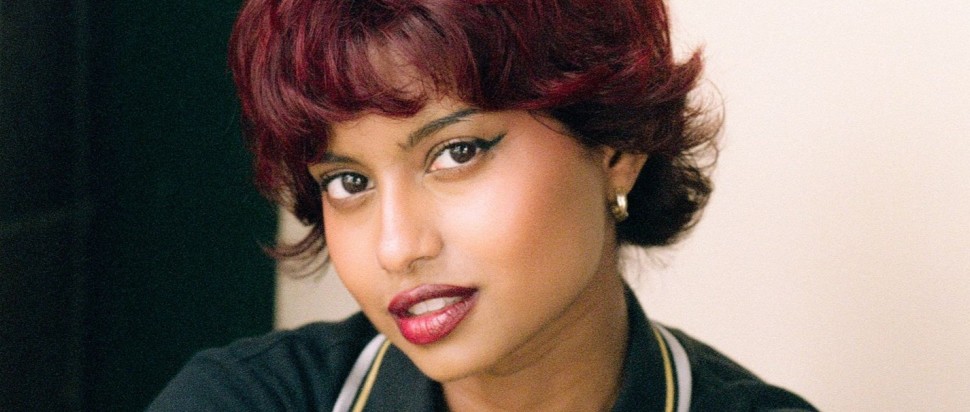Express Yourself: Jay Mitra on punk poetry
We chat with poet and multi-slam champion Jay Mitra about the role of punk in poetry ahead of their appearance at Push the Boat Out Festival
It would be easy to describe punk through a reductive set of stereotypes: spiked bleached mohawks, studded chokers and a foul-mouthed sense of humour. But for spoken word artist Jay Mitra, punk offers an irresistible way of being, a kind of praxis that both rejects our violent realities and discloses the possibility of softer, hopeful futures. “Punk is a resistance to the establishment. It's often supporting marginalised voices and [is] a very powerful expression of self, regardless of judgment,” they explain to me over a Zoom call. This is the foundation from which Mitra approaches their creative practice. Their poems challenge the audience to think, feel and move together, drawing us away from our individual subjectivities to bind us together as a collective. “Punk poetry has given me the space to feel like the frontman of a band, without a band. Which was always my dream,” Mitra laughs.
Mitra’s poetry often engages with stereotypes of South Asians in the UK, stereotypes which assume parity amongst distinct communities despite their diverse characteristics. I ask them about their poem Green Flame, in which Mitra disassembles Indianness and Britishness, and then playfully recreates a hybrid identity, one that resembles their own reality. “I was just navigating this grey, in-between space, but also finding a way to triumph even in that grey space, and regain my confidence,” they muse. But engaging with race in their poetry is also a way to enrich the punk scene by opening it up to more cultures, contexts and realities.
“Punk poetry and the punk scene in general has always been whitewashed,” Mitra says. “So for me, claiming that title of a punk poet is sort of me reclaiming that space in which people that look like me were maybe pushed out or ignored.” This urge to create space, to question and to disrupt, is best epitomised by how Mitra defines their success. “If it's boring to listen to, if it doesn't change [the audience’s] thinking in some way or get them to reconsider something, then in my opinion, I feel like I failed as a poet.”
Although Mitra claims affinity with the punk movement, it does not stop them questioning its contradictions, particularly its tendency to reproduce the very hierarchies it claims to resist. Mitra identifies the election of Trump as heralding a new era for the punk movement, finding fertile ground in the president’s oppressive declamations. “These bands, these artists that have built entire careers off being for the people and fighting the establishment are now working in support of the establishment and encouraging very harmful rhetoric,” Mitra says.
“During the Black Lives Matter protests, I remember seeing John Lydon [lead vocalist of the Sex Pistols] supporting Trump, a known white supremacist. Even now with people being dragged out of their homes by ICE,” they say. “It just feels completely contradictory to what I feel punk stands for.” Mitra is quick to stress that the rise of right-wing hate speech is derived from governments’ failure worldwide to meaningfully address the social reality of deprived communities. “I think a lot of it comes down to working class anger, not finding the right cause of their problems, you know?” Mitra continues. “We’re seeing it now with the Reform voters, people are angry, and they don't know where to put their anger. So when the media tells them to blame it on the immigrant, the people coming on the rubber dinghies, then now they have someone to blame for their problems.”
In this context, Mitra identifies an opportunity for their poetry, and for culture at large, to invite audiences to move away from the discursive and rise towards collective action and mobilisation. “Art can only go so far,” stresses Mitra. “It takes people actually on the ground, doing that outreach and having those difficult conversations that are actually going to make a difference.” Mitra is particularly clear on the role of the artist and their responsibility to couple their work with clear tangible action. “I think it's really important as artists, especially if you're claiming to be against this oppression, to get stuck in and do something about it. Raise money if you can.
“Your music means nothing unless you’re actually doing the work,” Mitra continues. “That beautiful line in your poem, is that it? Is that the only contribution you’re making?”
For Mitra, the role of punk poetry, and of culture more broadly, extends far beyond self-expression. It is a call to action, a way of keeping the possibility of revolution alive, despite the intensifying pressure to cease resisting. “The thing about my words is, the topics that I try and cover are quite diverse.” They pause, considering their statement before they continue. “But I think what I'm aiming for is maybe just a world of more understanding for each other. Especially for people of colour. We have to work ten times as hard to get the same level of respect, it’s exhausting. But it doesn’t have to be this way.”
Jay Mitra will appear alongside Tim Wells at The Ranting Poets, Pleasance Cabaret Bar, Edinburgh, 22 Nov, 5pm, part of Push the Boat Out
